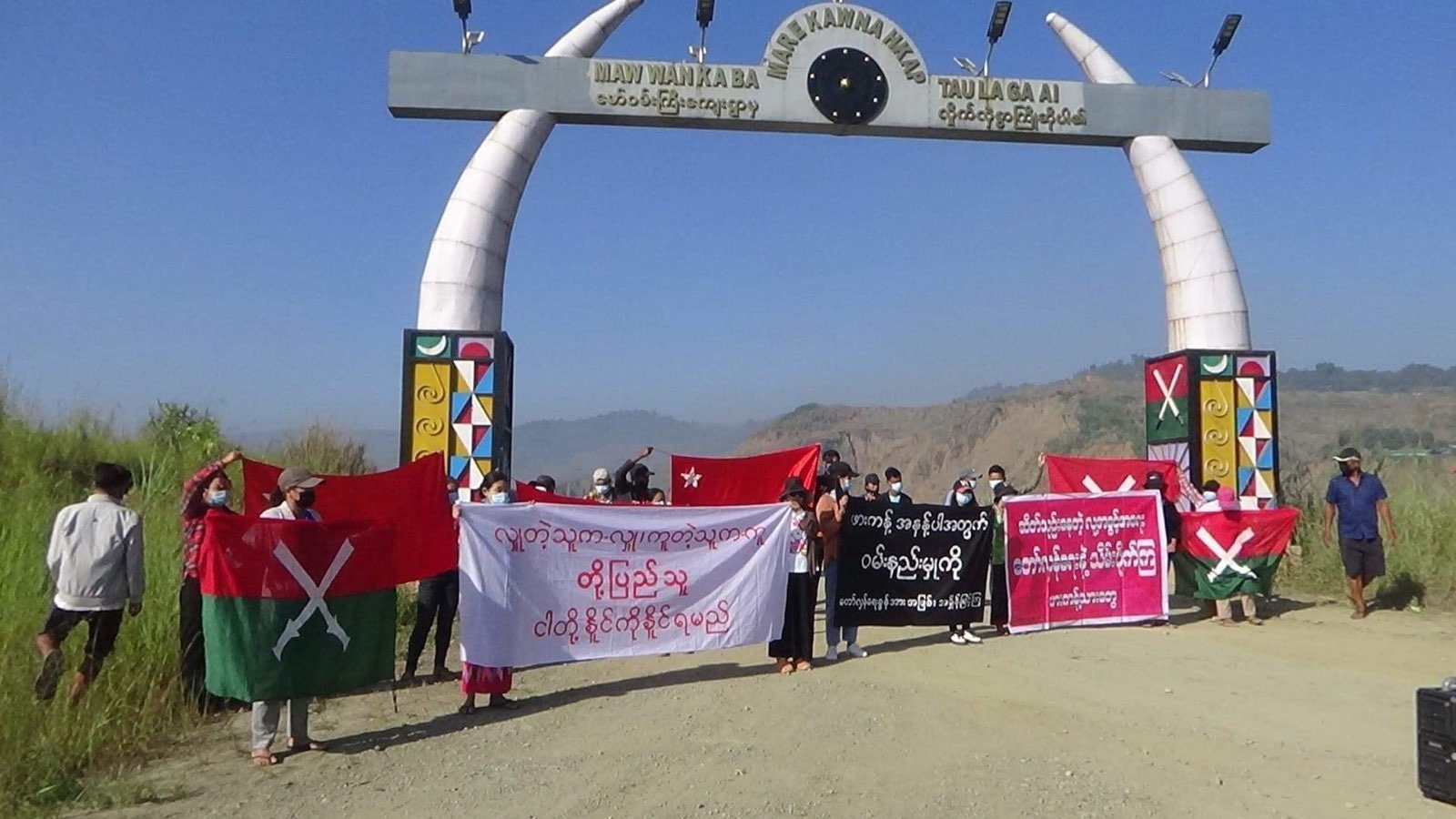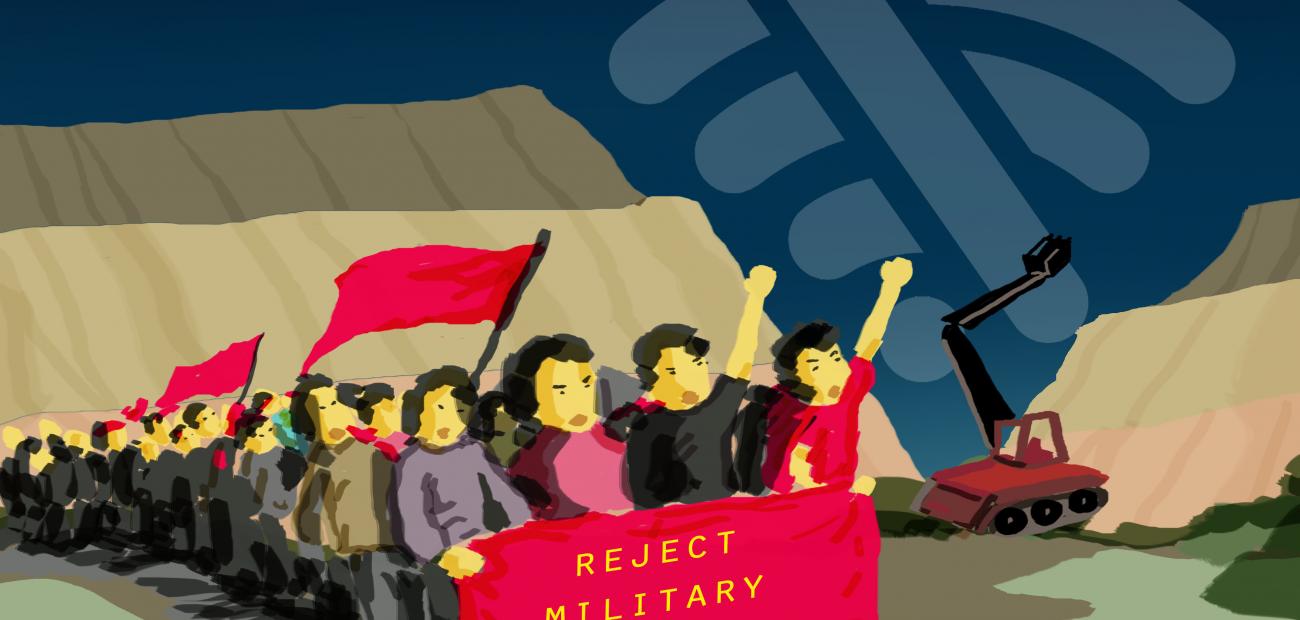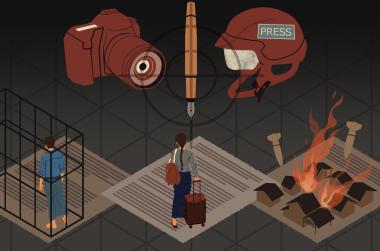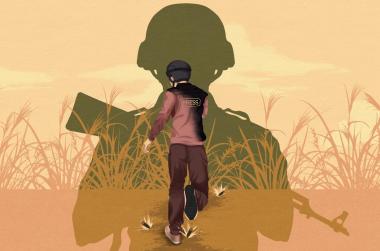The writer is a journalist in Kachin State who is receiving support from The Kite Tales to write these diaries.
Two weeks ago a terrible, unforgettable tragedy struck one of our towns.
Myanmar junta’s military jets launched an indiscriminate bomb attack during a music festival in Hpakant, a town in northern Kachin known for its precious jade.
Dozens were killed and dozens more injured, including children. Images from the scene show the scale of the carnage, wooden structures smashed, personal effects strewn on the forest floor. One shot shows bodies arranged in a line on tarpaulin that stretches almost as far as the eye can see.
In the immediate aftermath of the Oct 23 attack, the Kachin Independence Army (KIA) said 62 people died and a further 62 were injured. Those who lost their lives were locals, some regional celebrities and KIA soldiers.
Local humanitarian groups said the toll could be higher and the number of injured now stands at over 100. Following the bombing, the junta denied victims access to healthcare and refused to allow cars into and out of the area.
This particularly shocking attack is one of the many horrendous episodes for which the military is responsible.
But in this hard bitten jade town, deep in the mine-scarred northern Myanmar hills, people are no strangers to defiance.
Even before the latest tragedy, Hpakant in northern Kachin state continued to see anti-military demonstrations long after other towns had been terrorised into silence. They continued despite the military killing a dozen protesters and cutting off internet and the constant threat of more violence.
Columns of protestors still regularly march through the town shouting anti-dictatorship slogans, a year and a half since the military coup in Myanmar on February 1, 2021.
"We will fight to the end. We will not let our passions cool,” one young man who has taken part in the demonstrations told me, brashly dismissing the situation in other Kachin cities, where rallies are now rare. “Are they ready to live under the military’s boots?"
You can meet a lot of different kinds of people in Hpakant. There are armed groups, local Kachin communities and migrant workers from all over Myanmar. According to the 2014 census, Hpakant has a population of more than 300,000 people. Many of them are drawn into the multi-billion dollar jade industry.
One of the most expensive gems, ‘imperial jade’ from Myanmar is highly prized across the border in China, bringing in billions of dollars every year to businesses and families linked to the military junta. But poor working conditions, a highly militarised region and drugs mean people in the town are not strangers to protest.
Hpakant was the first town in Kachin to see street protests in response to the military coup, with a march on February 7, 2021. Just a few weeks later when millions of people across Myanmar staged demonstrations, hundreds of thousands also protested in Hpakant Township.
Things became more difficult afterwards.
On March 14, Ko Kyaw Lin, a protester, was shot dead. Another protester, Ko Thant Zaw, was shot and killed on March 27. A third, Ko Wei Phyo, died on May 2. All were demonstrating in Hpakant.
In all, the military killed a total of 12 innocent protesters in the town as soldiers launched brutal crackdowns across the country. Rights monitors say that 2,327 people have been killed across Myanmar and more than 15,000 arrested by the military since it grabbed power.
As a result, the protests that filled the streets of towns and cities across the country have gone quiet.
But people in Hpakant remain undeterred.

Protesters are vocal in their loathing of army general Min Aung Hlaing and his colleagues, wishing them elaborately unpleasant deaths. They support the KIA (the Kachin ethnic armed organisation) and the PDF (local resistance forces).
They call for federal democracy and vow not to be ruled by the terrorist army. They swear the revolution must succeed.
“They’re not doing it because it’s easy,” said U Aung Hein Min, the elected member of parliament in Hpakant who won the 2020 election, who is now in a liberated area.
“They’re going out on strikes in the midst of all kinds of difficulties. This spirit of the people of Hpakant deserves honour and respect. It is this spirit that is propelling them forward, that is keeping them going.”
Perhaps it is precisely because of these strong sentiments that the military council cut the Internet in Hpakant on August 20, 2021, causing a news black out that is now over a year old.
But people here already know all they need to about the behaviour of Myanmar’s military.
“All over the country, houses have been burned and destroyed. People have been killed,” said the young protester.
“No matter how much we are oppressed, we will not be quiet. We will continue striking until the end of the revolution and we are victorious. The strike, armed revolution, the resistance - none of these can stop.”
With the latest tragedy, Hpakant residents continued to express their opposition to the coup regime. Protests have started again, this time with banners vowing to avenge the lives lost on Oct 23.
The artwork is by an anonymous illustrator who is receiving support from The Kite Tales to produce illustrations.





